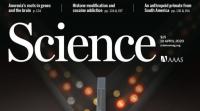Rethinking Anorexia
Science 10 Apr 2020: Vol. 368, Issue 6487

Anorexia nervosa is thought to affect just under 1% of the U.S. population, and manifests with self-starvation and extreme weight loss. About 10% of those affected die, the highest mortality rate of any psychiatric condition after substance abuse. With current treatments, about half of adolescents recover, and another 20% to 30% are helped. Although environmental factors certainly play a role, too, scientists are now finding that the disease's biological roots run deep. Genetic studies indicate that it's highly heritable, and the brain's reward system behaves differently in unaffected volunteers than in people with anorexia and those who've recovered. Scientists pursuing these ideas face a challenge, in part because of money. Many researchers say the funding anorexia receives is shockingly low given its burdens. Scientists worry that anorexia is underfunded in part because of an enduring view that its roots are cultural. But evidence is mounting that biology is at its core.
